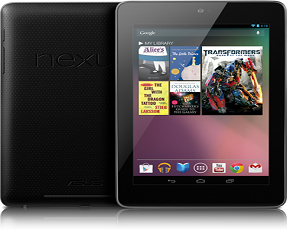Google has unveiled its first branded tablet – the Google Nexus 7.
The device will run on the latest edition of the company's mobile operating system, Android 4.1 – codenamed Jelly Bean – measure just 7in and feature a 1280x800 high-definition (HD) display.

Despite being targeted as a budget tablet to compete with Amazon's Kindle Fire – the price tag starts at just £159 – the Nexus 7 still has favourable features inside, such as a quad-core Tegra 3 processor, 1GB of RAM and a 12-core GPU.
However, lower cost does equal lower memory, with only 8GB or 16GB models available, costing £159 and £199 respectively, and no microSD slot for extra storage. The tablet is also Wi-Fi only, rather than having a 3G or 4G option.
Yet the Nexus 7 still touts a 1.2 megapixel forward-facing camera and a microphone for video calling, as well as near-field communications (NFC) technology for Android Beam, allowing contacts and content sharing by tapping devices together. It also features built-in HDMI for using with other screens, and Google claims it has an eight-hour battery life for active use.
Entry-level tablets right for Google
The Nexus 7 may not boast the technical specifications of the market-dominating Apple iPad, but Forrester analyst James McQuivey said this is the right path for Google to take.
"Learning a lesson from Amazon, Google can see that the only way to beat the premium-level iPad is to go for the millions of customers who are ready for smaller and cheaper tablets, then grow those customers into more Android-powered devices and, more importantly, Google-powered services such as Google Play and whatever paid video experience YouTube will likely create," he said.
"That range of services will be the secret to stitching together this rag-tag fleet of Android gadgets into a platform that can compete with Apple for minutes of users' attention rather than premium device dollars," added McQuivey.
Google faces tough competition from Apple and Amazon
However, fellow Forrester analyst Frank Gillett said Google had a lot more to do to catch up with both its major rivals.
"Google's user base for music, books and movies is not nearly as strong as Apple or Amazon, so it will take time to build a strong customer base," he said.
"But Google's real tablet problem is the lack of compelling tablet-optimised apps – it has yet to address how to motivate developers to fill the gap. Nor has Google addressed the continuing and growing fragmentation problem, where few devices are updated to the current OS [operating system] because carriers and device makers don't push out the new versions or users don't take them," said Gillett.
Those who want to test the device for themselves won't have to wait long. Google confirmed it would be releasing the Nexus 7 in the US, UK and Australia in July, with the added bonus of a £15 Google Play voucher – previously the Android Market app store – for its customers.





